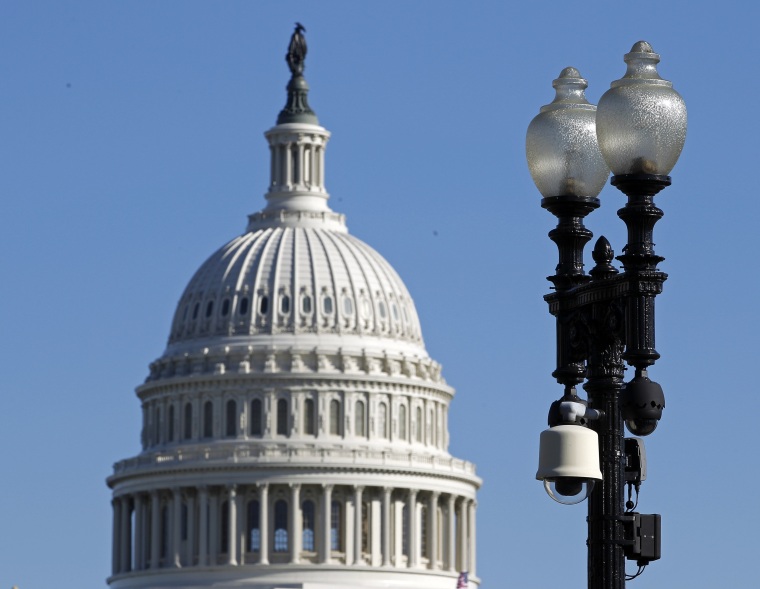In an election year dominated by bombastic rhetoric and a Republican frontrunner who makes daily headlines for controversial statements, Senate Republicans are privately debating whether some in their ranks may need to distance themselves from Donald Trump if he were to win their party’s nomination for president.
“You will find candidates who will have to separate themselves from the party's nominee if somebody like him is the nominee," Senate Majority Whip John Cornyn (R-TX) told reporters of the prospects of Donald Trump winning the Republican nomination for President.
FOLLOW LIVE: Latest Updates From Super Tuesday States
“Some of the controversial statement he's made, for example, not disavowing David Duke when he had the opportunity to do so, he seems like he would be a lightning rod,” Cornyn said of Trump.
Senate Republicans, in the majority for the first time since 2007, have 24 seats they need to defend in November, 21 of which are senators seeking reelection.
But with Donald Trump making headlines with language and policy proposals that are being openly criticized by Congressional leadership, some Republicans are worried having Trump on the ballot could hurt their chances to hold onto the majority. Republicans currently hold the majority with 54 seats.
“It’s a concern to have Trump at the top of the ticket, no doubt, for anybody on the ballot,” Sen Jeff Flake, a Republican from Arizona, told reporters.
Trump has received a public rebuttal from Republican leadership in Congress twice in recent months, first in December for his proposal to ban Muslim’s from coming to the United States, and most recently this week for failing to immediately disavow David Duke and the KKK during an interview Sunday on CNN.
The most recent controversy prompted both House Speaker Paul Ryan, a Republican from Wisconsin, and Senate Majority Leader Mitch McConnell, a Republican from Kentucky, to condemn Trump, with Ryan saying “this party does not prey on people’s prejudices.”
“If a person wants to be the nominee of the Republican party, there can be no evasion and no games, they must reject any group or cause that is built on bigotry,” Ryan said.
“Senate Republicans condemn David Duke, the KKK, and his racism,” McConnell said later, “That is not the view of Republicans that have been elected to the United States Senate, and I condemn his comments in the most forceful way.”
The prospect of a Trump candidacy has many Senate Republicans up for reelection balancing a tight-rope of rhetoric when asked if they will support the real-estate developer if he were to become the nominee.
“I’ve always said I was going to support the nominee, I’m hopeful I’ll be able to support the nominee,” Senator Richard Burr, a Republican from North Carolina, told reporters when asked if he would support a Candidate Trump.
A spokeswoman for Senator Kelly Ayotte, a Republican up for reelection in New Hampshire, released a statement saying the Senator “intends to support the Republican nominee, however she would like to see how the process plays out.” Ayotte herself said she found “Mr. Trump’s response to David Duke and the KKK disgusting and offensive.”
But others says they will support the Republican nominee no matter who it is.
“I haven't endorsed anybody, and won't, and I'll support the ticket in November,” Sen Johnny Isakson, a Republican from Georgia, said when asked if he would support Trump as the Republican nominee.
“I'll support the nominee,” Sen Roy Blunt, a Republican from Missouri, said, “I think any of our candidates would be a better President than Secretary Clinton or Senator Sanders.
Sen Lindsey Graham, a Republican from South Carolina who recently ended his own bid for the Republican nomination and has been intensely critical of his party for embracing Trump, says he believes his colleagues are “not going to be judged by Trump,” saying “Americans are fair.”
“Let’s see what happens at the convention, if he does win what kind of Trump do you get?” Graham told reporters, “I mean, at the end of the day everybody has got to make that calculation.”
Senator John Thune, the Chairman of the Senate Republican Conference who is also up for reelection, criticized Trump for his response to questions related to the KKK, but admitted that there will be times when Republicans “may not agree with something that the person that’s leading your party says.”
“I’ve always said that Republicans in Congress have to run their own races, you know, you’ve got to take care of your own business,” Thune said, “It doesn’t matter what’s happening above you. Obviously that has down-ballot impacts but you can’t control that.”
Only one Republican Senator, freshman Ben Sasse from Nebraska, has publicly said he will not support Trump if he becomes the nominee, arguing in a lengthy open letter on Facebook that he would instead look for a third option.
Senator Flake, who has criticized Trump’s past rhetoric, says while he’s “not willing to concede” that Trump will be the nominee, he is not sure if Congressional Republicans can do anything to stop him.
“From a group that has about, what, nine percent favorables right now, for us to go tell people how to vote probably doesn’t make that much difference, frankly,” Flake admitted.
But when asked if he believed Trump’s excuse for not immediately condemning the KKK and David Duke, Flake did not mince words.
“To blame it on a faulty earpiece--people know, I mean, KKK is pretty easy to hear,” Flake said.

